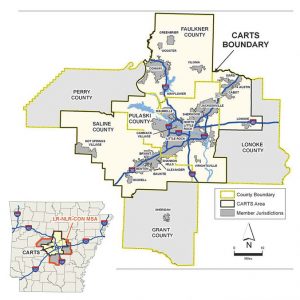calsfoundation@cals.org
Metroplan
Metroplan is the federally designated Metropolitan Planning Organization (MPO) for central Arkansas. Metroplan’s core responsibilities are to determine long-term transportation needs and priorities for federal funding for the region. It does so through a council of local governments, the Arkansas Department of Transportation, and local transit agencies. From its inception in 1955, Metroplan evolved from an organization focused on planning needs in Pulaski County to a multi-county association with a federal mandate.
Metroplan is supported by member dues and federal and state grants. Membership is open to local governments and covers five counties: Pulaski, Saline, Faulkner, Lonoke, and Grant (non-voting). Its office is housed in the Pulaski County Regional Building in Little Rock (Pulaski County).
Originally named the Metropolitan Area Planning Commission of Pulaski County (MAPC), it was created after plans to build a U.S. Air Force base near Jacksonville (Pulaski County) exposed the lack of a central planning authority to coordinate local government involvement. Little Rock businessman Raymond Rebsamen led the Committee of 100, also known as the Pulaski County Citizens Council, composed of business and civic leaders to organize planning for the potential base. The group raised money and successfully lobbied to construct U.S. Highway 67/167 between Jacksonville and Little Rock.
Realizing a need for a permanent organization, the Arkansas legislature unanimously passed Act 26 of 1955, “An Act to Enable Political Subdivisions to Cooperate Jointly in Area Planning; and for Other Purposes.” It was signed by Governor Orval Faubus on February 1, 1955, and MAPC was officially formed.
MAPC’s original responsibility was to 1) “Make studies and propose plans to guide development of the area,” and 2) “Eliminate duplication of planning and promote economy of effort in the area’s development” in Pulaski County. Board positions included public officials and appointed private citizens. The Housing Act of 1954 provided federal funding for its operation.
MAPC held its first meeting on March 3, 1955. Rebsamen was elected as its first chair. Its first project was to apply for an urban planning grant under the Federal Urban Assistance Program. It was subsequently awarded a $21,775 grant. Next, MAPC hired staff and rented an office at 209 ½ West 2nd Street in Little Rock. John Crane was hired as the first executive director. Projects focused on long-range planning and providing technical expertise to members. In 1965, MAPC’s jurisdiction expanded to Saline County. As membership increased, its scope broadened and included studies on business and commercial activities; standards for school planning; and water distribution and land use in Pulaski County.
In 1970, MAPC underwent its first major reorganization and incorporated as a nonprofit organization. It removed private appointments from its board and became a council of local governments. It also became a trustee of the Central Arkansas Transit bus system. To reflect these changes, the association was officially renamed Metroplan, a name coined by Jason Rouby, who would succeed Stuart Eurman as executive director in 1966. Rouby retired in 1988, and Jim McKenzie replaced him as executive director.
Throughout the 1970s, Metroplan’s activities grew in diversity, which included providing planning assistance to nineteen local governments in Saline and Pulaski counties, reviewing federally financed projects, and conducting neighborhood analyses.
In 1972, Metroplan received its official designation as a Metropolitan Planning Organization (MPO) by the federal government, which shapes its central responsibilities today. MPOs are divided into study areas, with Metroplan responsible for the Central Arkansas Regional Transportation Study Area (CARTS), previously referred to as the Pulaski Area Transportation Study Area (PATS). As an MPO, Metroplan must adopt both a long-range transportation plan, covering at least twenty years, and a short-range implementation document for the CARTS area.
Today, Metroplan also offers planning, mapping, and technical help to members; maintains a data center that collects regional demographic, housing, and population databases; and provides support for programs concerning environmental issues, including air quality, drinking water, and the Central Arkansas Green Agenda.
A board of directors, referred to as the MPO Board, governs Metroplan and consists of member jurisdictions’ mayors and county judges or their designated representatives, as well as two voting members representing the Arkansas State Highway Department and the Central Arkansas Transit Authority (CATA). The MPO Board oversees the Technical Coordinating Committee, the Regional Planning Advisory Council, and a paid staff of sixteen.
Federally required publications produced by Metroplan include the Metropolitan long-range transportation plan, the short-range implementation document called the Transportation Improvement Plan, the Annual List of Obligated Projects, the Unified Planning Work Program, the Public Participation Plan, and the Self-Evaluation and Transition Plan. Metroplan also annually publishes Metrotrends: Economic Review and Outlook and Metrotrends: Demographic Review and Outlook.
For additional information:
Campbell, Monica N. “‘Slums Are Our Most Expensive Luxuries’: Little Rock’s Metroplan and the Making of the Neoliberal City, 1939–1980.” PhD diss., University of Mississippi, 2021. Online at https://egrove.olemiss.edu/etd/2150/ (accessed May 24, 2023).
“Central Arkansas Regional Transportation Study (CARTS).” Metroplan. https://metroplan.org/carts/ (accessed October 6, 2021).
Metroplan. http://www.metroplan.org (accessed October 6, 2021).
Metroplan Records, 1955–1988. Center for Arkansas History and Culture. University of Arkansas at Little Rock, Little Rock, Arkansas.
“Progress 1955–1975.” Little Rock: Metroplan, 1975.
Williams, Harry T. Metroplan: The Formative Years, 1955 to 1970: An Analytical History of the Metropolitan Area Planning Commission of Pulaski County. Little Rock: Metroplan, 1989.
Shannon Marie Lausch
UALR Center for Arkansas History and Culture
 CARTS Region Map
CARTS Region Map 



Comments
No comments on this entry yet.